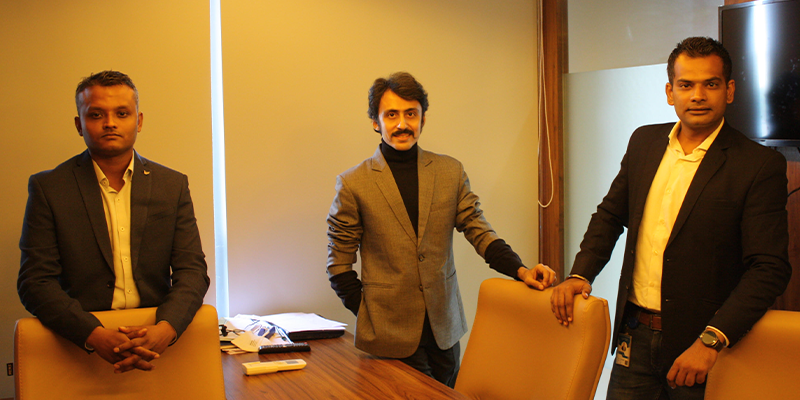Focusing on quality helped this solar energy startup find its place in the sun
Ahmedabad-based solar energy startup URON Energy, which offers end-to-end solutions and works with residential, corporate, and government clients, expects to clock $2.5 million in revenue by the end of 2020.
Urvish Dave was always fascinated by solar power. He graduated in electronics engineering in 2009, but kept himself abreast with the latest developments in the world of solar energy.
Ten years later, in October 2019, Urvish, along with Khrushendu Choksi and Raaj Patel, launched Ahmedabad-based solar energy startup .
The clean energy startup, bootstrapped with an investment of $20,000, offers end-to-end solar solutions from concept till commissioning to all types of clients - corporates, residential, and government.

URON Energy Founders: Raj Patel (left), Urvish Dave and Khush Choksi
The founders are to facilitate India’s National Solar Mission, which aims to achieve 40 GW of rooftop solar power generation capacity by 2022.
In the beginning
Urvish began his career by consulting with several companies that were largely in the solar energy segment. During his interactions with different kinds of customers, he realised majority of them were not given accurate information on how to install, operate, and maintain a solar plant.
He felt companies delivering these products and services were only interested in setting up the facility “without much consideration about quality and standards”.
“My experience showed that many were using outdated technology and there were no regulations governing the sector,” Urvish says.
As a consultant, Urvish was getting many offers from companies keen for him to execute their solar projects. It was at one such customer meeting that he met his co-founders.
A chance meeting with a company interested in setting up a solar plant led to the birth of URON Energy. The company had received quotes ranging from Rs 3.5 crore to Rs 5 crore and was confused.
“I explained the various kinds of technologies and what would be best for them. I also told them that we could give in writing that theirs would be the best solar power-generating plant in the entire state,” Urvish says.
The contract was signed, and the plant was set up in the state of Gujarat in 2020.
Industry scenario
Things have changed considerably since then. Solar has emerged key to India’s growing energy needs. The government has already come out with an ambitious renewable energy goal of 175 GW by 2022 and 450 GW by 2030; solar will play the main role in this.
The rising popularity of solar energy has also led to a drop in costs. Around 10 years back, the average cost of installing one MW of solar power was around Rs 17.61 crore; this has come down to around Rs 3.2-3.5 crore.
This reveals that there are a large number of players, but Urvish says majority of them are doing just “the engineering, procurement, and construction (EPC) work without having a holistic approach” towards a solar project.
URON Energy wants to address this problem. It aims it to be a quality player in the solar energy segment and provide utmost transparency to customers.
“Everything seems fine once the solar plant is commissioned, but nobody looks at how well it functions after two years or whether it is generating optimum energy,” Urvish says.
The solar startup wants to change this status quo.
What URON Energy does
Solar energy generation looks very simple from a layman’s perspective: one can see the panels and inverter that generate energy, but is “much more complex”. “No two solar roof panels will have the same output,” Urvish says.
Uron Energy was very clear was they would not be a mere EPC company, and would provide complete end-to-end services. This includes project conceptualisation, design engineering, implementation, and maintenance.
“As we have worked on various kinds of solar technologies, we provide optimum solutions to customers. We have realised that if one provides accurate information, people are willing to pay a premium,” Urvish says.
URON Energy also signs agreements to maintain solar energy plants for a couple of years under the build, own, operate, and transfer (BOOT) concept.

A project executed by Uron Energy
Since inception, the clean energy startup has worked on eight projects. It has deployed its solutions at three locations (a total of 2.2 MW). It provides ground-mounted and roof-top solar energy services.
URON Energy also deals in organic photovoltaic panels, which can be customised to any shape. These prove very useful in the hospitality industry where these panels can be used as a façade and to generate energy.
This solar energy startup also uses waterless cleaning technology for the panels through the use of robots.
The present and the future
Currently, URON Energy is operational in Gujarat and National Capital Region (NCR). It has also received a few overseas inquiries. It has bagged a few orders from Australia and Tanzania, but is unable to execute these projects due to COVID-19.
“We are getting inquiries from Africa where they are not looking at just a cheap option, but also for good engineering and technology standards,” Urvish says.
Urvish says the startup has already clocked revenue close to $1 million, and expects to touch $2.5 million by the end of 2020.
The startup has aggressive plans and aims to reach a revenue of $10 million in the next two years and expand within India and overseas.
“We would like to known as the one-stop shop for everything related to solar. We want everything to be in-house for only then we can ensure quality controls,” Urvish says.
(Edited by Teja Lele Desai)














